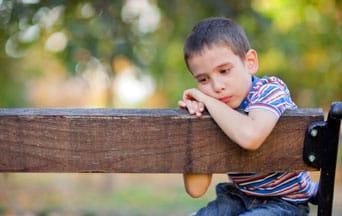
“They take us away from our parents for things that they’re not doing, but then y’all not doing the things you’re supposed to do. Who’s going to take us from you?”
An Overburdened System
These words came from one of the over 437,000 children in the Foster Care system in the United States, in this case, a tenth-grade student in Michigan. NBC News quoted him in a recent story. While the cases are anecdotal, the story does reveal major problems inside the system.
The NBC article primarily consists of the experiences of four young people who spent most of their lives in a bureaucracy that was too busy to look out for their interests. In each case, the state-run schools to which the system sent these children and adolescents not only failed to educate them but didn’t even give them credits that they could transfer when they wanted to continue their educations.
Indeed, the State often tells parents how to raise their children while not adequately caring for many of those already in its custody.
Who Are These Children?
The Cornell Law School states that the term “foster child” refers to “a minor child who has been taken into state custody and placed with a state-licensed adult, who cares for the child in place of their parent or guardian.” The preference is that the “state licensed adult” be the head of an otherwise conventional home, who can raise the child temporarily until a permanent adoptive family is found.
Eternal and Natural Law: The Foundation of Morals and Law
Such a situation may work for very young children. However, adoption is highly unlikely in the cases of those that the State assumes care for as adolescents. These unfortunate ones go to “group homes” or larger institutions.
An Old and Thorny Problem
The problem of raising children whose parents cannot do so—whether the reason is death, disability, or simple neglect of parental duty—is as old as human society. In Christian countries until the beginning of the industrial age, godparents raised such children. Usually, the godparents were family members or friends of the child’s natural parents. Their ability to raise the child if necessary was one of the elements that determined their selection for this important role.
If the godparents could not fulfill this duty, another family member would assume the task. In cases where children had no family member capable of raising them, they would be placed in a Church-run orphanage.
A natural progression occurred in which the first recourse was to those selected by the child’s parents, then to other family members. Finally, in the direst straits, there was recourse to an institution.
“I’m From the Government, and I’m Here to Help”
That solution unraveled as the State began to usurp the appropriate functions of the Church. In Europe, the first step came when King Henry VIII suppressed Catholic monasteries—some of which operated orphanages—as part of his revolution against the Church. While not as dramatic, comparable situations happened in most countries that adopted Protestantism. Roughly 250 years after Henry’s death, the French Revolution impacted orphanages in much the same way as the overthrow of the Italian Papal States in 1870.
 Learn All About the Prophecies of Our Lady of Good Success About Our Times
Learn All About the Prophecies of Our Lady of Good Success About Our Times
These processes plunged orphans into desperation. Many died, others became virtual slaves, and far too many became “street urchins,” having to support themselves in the new industrial urban centers.
Eventually, starting about 1840, the Church and other charitable organizations reopened orphanages in many cities. However, the need always outstripped the resources. Ultimately, the State stepped in to deal with the issue.
Bureaucracies Cannot Raise Children
The results have not been good. The most secular State often serves the orphans as a bureaucracy, not a parent.
Some family situations are so bad that the State has to intervene to protect the physical well-being of the children. Often, parents who use “recreational” drugs neglect their children. Some parents take out their frustrations by physically and emotionally abusing their children. During his teaching career, this author remembers being approached by a student who asked, “Do I have to testify in court against my parents?” The parents were being tried—and were convicted—of starving another of their children to death.
This confused culture has too many such stories.
“Social Justice” and Foster Care
The State’s power to intervene in cases of abuse is now being expanded to include cases to advance “social justice.” Adolescents tempted to embrace a homosexual or “trans” lifestyle despite their parents’ disapproval can receive “relief” from the State. Parents resisting “gender-affirming” surgeries can lose their children permanently.
Science Confirms: Angels Took the House of Our Lady of Nazareth to Loreto
In 2020, National Review quoted an article in the Journal of Medical Ethics that describes these policies:
“Ultimately, allowing transgender minors to consent to gender-affirming treatment, that is, over-riding parental consent, should be sought only when all other avenues to try to bring caretakers around have failed or if approaching them poses a clear and present risk to the minor’s well-being.”
In other words, the State can force parents (“caretakers”) to comply.
These adolescents, taken by the State due to parental’ “neglect,” end up in the foster care system. The same system cannot even ensure that all children already under their care can get a basic education.
However, leftist revolutionaries often do not care if their pseudo-solutions actually work. They deceive themselves and the public by claiming their motivations will make the child’s life better. However, their overriding goal is to destroy the remnants of Christian morality, especially sexual morality in society. This twisted vision of society sees this morality as the main evil. Tragically, the children become pawns in their never-ending quest to remove all limits and any semblance of order.
Photo Credit: © V&P Photo Studio – stock.adobe.com

